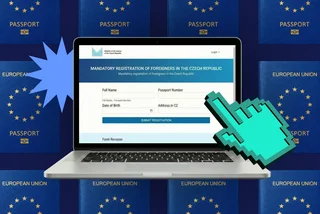Renting culture in the Czech Republic has evolved significantly in recent decades, as has the tenant-landlord relationship developed significantly in the same timeframe. This means the contemporary tenant-landlord relationship is relatively new. Protections enshrined in the Czech Civil Code in 2014 have mirrored regulations elsewhere in Europe. However, their real-world implementation has faced challenges as the private rental sector matured.
We asked real-estate law specialist Dr. Lukáš Dulíček from Engel & Völkers Prague to shed some light on the history of the tenant-landlord relationship in Czechia and to outline the most basic rights of foreign renters.

A brief history of the tenant landlord relationship in Czechia
During communism, private property was essentially prohibited. Most lived in state or cooperatively-owned housing with little say over living conditions. After the fall of communism in 1989, ownership was transferred to occupants and private rentals re-emerged, though homeownership has remained strongly preferred culturally.
Dr. Lukáš Dulíček, Engel & Völkers Prague“We have almost the same law regulations and tenant protection in our Civil Code as Western countries but not all of them are well enforced. This means that sometimes landlords think they can do anything.”
The good news is that sound legal protections now exist for tenants to understand their rights and resolve disputes if needed. Overall though, the Czech legal framework safeguards tenants’ interests.
Do you know your basic tenant rights?
- Tenants can request repairs and expect habitable living standards to be maintained.
- Rent increases are capped at 20 percent every three years without a tenant agreement.
- Utilities and related costs can be passed to tenants within reason.
- Non-discrimination protections exist based on attributes like family status or nationality.
- Proper notice is required to terminate leases unless serious violations occur.
- A landlord can decline an applicant without providing a reason.
A landlord can decline an applicant without providing a reason
While it’s not legal for a landlord to say they won’t rent to you because you are a foreigner, it is legal for them to tell a potential tenant that they will not rent their property to you without giving a reason. That means landlords also retain the right to decline applicants without providing a reason.
A landlord can request documentation and require a credit check
Where stringent financial and background screening of applicants is standard in countries with more developed private rental systems, Czech landlords generally do not yet view such verification as an essential part of the rental process. Ultimately, the selection of tenants remains largely at the discretion of individual landlords under current Czech market conditions.
Dulíček suggests consultation with a lawyer if a tenant has issues with their landlord. Mutual agreement between both parties is the easiest termination method.
While they do not typically require these documents as rigorously as is common practice for landlords in many Western rental markets, Czech landlords are legally permitted to request supporting documentation from prospective tenants, such as proof of income, references from past landlords, or credit checks.
A landlord cannot terminate your lease at will
Termination rules differ depending on if the lease is for a limited or unlimited period. There are also differences if the tenant is an individual or company, and if the apartment is for residential or commercial use. Older leases may fall under different termination rules outlined in the Civil Code.
Generally speaking, landlords can terminate the use of the apartment for themselves or a family member. Either party can terminate for "gross violation" of the contract by the other, but this is narrowly defined. However, a proper notice period outlined in the lease or law must always be followed.
The landlord cannot raise the rent at will
Rent cannot be increased during the term of a fixed-term lease contract. An inflation clause in the contract allows rent to be raised based on inflation rates. Without an inflation clause, the Civil Code caps rent increases at 20 percent over any three-year period. (Inflation clauses can be included in both fixed-term and unlimited contracts, but don't make much sense in fixed contracts.)
The landlord cannot stick you with unreasonable utility bills
Up to the base rent amount, tenants can be responsible for pre-payments towards building utilities. Typical utility pre-payments borne by tenants include: water consumption, electricity for common areas, waste disposal, lift service, and cleaning of common areas. Pre-payments like repair funds and building insurance should be paid by the landlord.
Electricity and gas supplies can either be transferred into the tenant's name directly, or kept in the landlord's name but costs are included in rental pre-payments. It is up to the agreement between the landlord and tenant whether utilities are billed directly to the tenant or included as pre-payments.
Don't hesitate to contact Engel & Völkers at Pragueandel@engelvoelkers.com. We will be happy to advise you and help you choose the ideal apartment for you, which will meet your requirements and will be in line with your particular living situation.












 Reading time: 4 minutes
Reading time: 4 minutes 





















